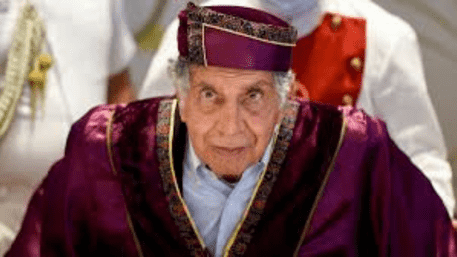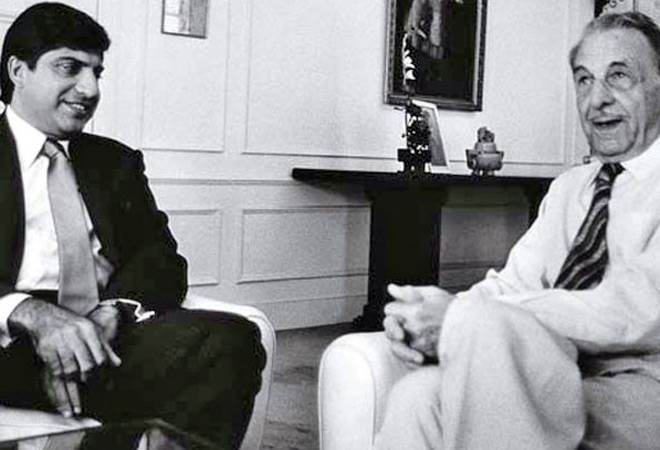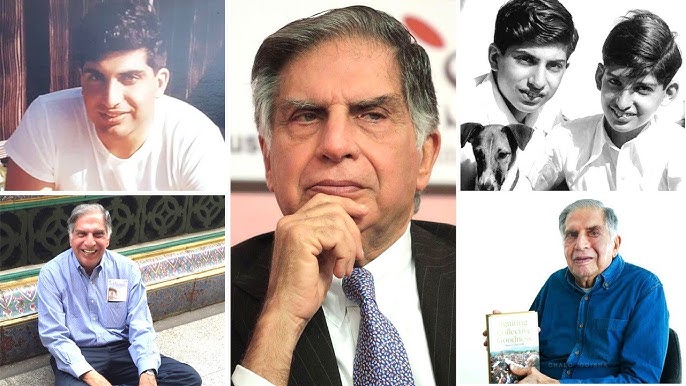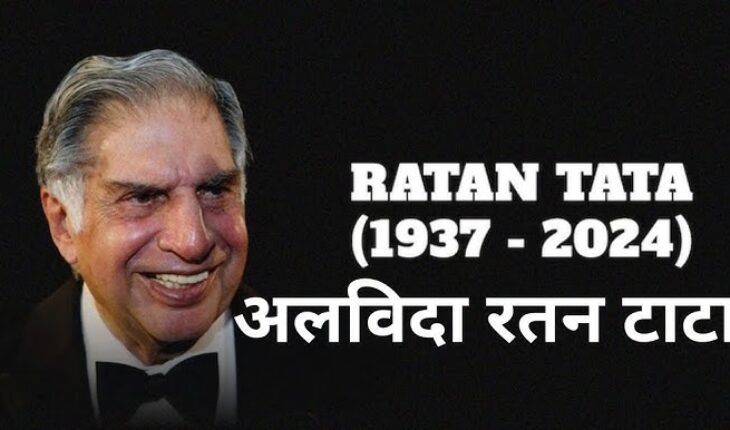On October 7, Ratan Tata himself clarified on X about his well-being and said that he was simply undergoing routine check-ups for his health conditions because of his old age while dismissing reports of his hospitalisation. He requested that the public and media respect refrain from spreading misinformation. At the age of 86, Ratan Tata breathed his last on October 9 at Mumbai’s Breach Candy hospital.

Ratan Tata, born on December 28, 1937 was the son of Naval Tata and Sooni Commissariat. Naval Tata himself was an adopted son of Sir Ratanji Tata. Ratan Tata was about 10-year-old when his parents separated. He was raised by Navajbai Tata, his grandmother and widow of Sir Ratanji Tata. He graduated with a Bachelor’s degree in Architecture and Structural Engineering from Cornell University. Ratan Tata in a video interview said once that he always wanted to be an architect, as it interested and motivated him. He spent two years in an engineering school too to realize that his interest lies in architecture. For about two years, after his graduation, he worked in an architect’s office in Los Angeles. In his interview, he further said, ‘I never regretted being an architect. I only regret that I was not able to practice it for long.’ On learning in an architectural curriculum, he said that ‘the sensitivity that you create as an architect, the ability to put things together, the ability to run a project on the basis of a budget, the intricacies of different materials coming together, all those things are well taught in an architectural curriculum.’ On connection between architect and business, he said that if ‘someone says one wouldn’t be equipped to do business as an architect then it would really not be a fair statement.’
He was close to his grandmother and due to her poor health, he came back to India. He got a job offer from IBM in India but Jehangir Ratanji Dadabhai (JRD) Tata persuaded him to work for the Tata Group. From 1962 onwards, he held various positions in Tata Group companies. He pursued Advanced Management Program 71 from Harvard Business School in 1975.

In March 1991, Ratan Tata succeeded JRD Tata as the Chairman of Tata Sons. After becoming the Chairman, he faced resistance from long-time executives within the conglomerate which included Rustomji Homusji Mody (known as Russi Mody), Ajit Kerkar and Darbari Sethi who were heading Tata Iron and Steel Company (TISCO) (became Tata Steel Limited in 2005), Indian Hotels, and Tata Chemicals. Russi Mody was removed by the TISCO board in April 1993. Darbari Seth retired from his roles at Tata Consumer Products and Tata Chemicals in 1994. Ajit Kerkar was also compelled to resign from Tata Group in September 1997. Prior to Ratan Tata, group companies were functioning in such a way that lacked a cohesive entity.
He was instrumental in transforming Tata Group into a ‘Salt-to-Software’ global conglomerate. In one of his interviews cited by Harvard Business School, he mentioned that in 1991, India experienced an economic crisis that caused even profitable companies within India to struggle, and that influenced him to start considering expanding beyond India due to geographic concentration risk. As a result, the Group established Tata Africa Holdings in South Africa in 1994. During his leadership, Tata Tea acquired the British-owned Tetley Tea, the first major international brand in 2000. It was the largest cross-border acquisition by any Indian company at that time. Another notable fact was that it was the first ever Leveraged Buy-out (LBO) by any Indian company. During this period, Tata group also acquired Videsh Sanchar Nigam Limited (VSNL) from the government in 2002. In 2007, VSNL was renamed as Tata Communications Limited. Other major acquisitions by Tata Group firms included acquisition of Corus, an Anglo-Dutch steel company by Tata Steel in 2007, Jaguar Land Rover in Britain in 2008. The reputation that the group had under Ratan Tata can be gauged from an incident when Tata Steel was trying to acquire Corus. At that time, Corus executives said the trustees might be happier striking a deal with Tatas, which has a reputation of a benevolent employer.

In 2022, i.e., after 69 years, Air India returned to its original founder, the Tata Group. The Government of India had nationalized Air India in 1953. Tatas had set up Tata Airlines way back in 1932 and it was renamed as Air India in 1946. JRD Tata continued as the Chairman of Air India till 1977. In October 2021 when Tata Group placed the winning bid for Air India then Ratan Tata had shared an old photograph of JRD Tata getting down from an Air India aircraft and wrote: – “The Tata Group winning the bid for Air India is great news! While admittedly it will take considerable effort to rebuild Air India, it will hopefully provide a very strong market opportunity to the Tata group’s presence in the aviation industry.”
In Tata group, the retirement age for non-executive directors was raised to 70 in the year 2000, and it was further raised to 75 in the year 2005. The age was again reverted back to 70 just one year prior to Ratan Tata’s retirement. At the age of 75, he stepped down from the Tata Group in 2012 and Cyrus Mistry was designated as the successor. Unceremonious exit of Cyrus Mistry led to appointment of Natarajan Chandrasekaran as the Chairman of Tata Sons.
On certain occasions, Ratan Tata opened up about his personal life too. In an old interview, he revealed that he had come seriously close to getting married as many as four times. He also said that in the hindsight, it was not a bad thing to remain unmarried and the situation would have been more complex had he got married.
Ratan Tata was known for his down-to-earth nature. In a speech, Nitin Gadkari, Union Minister of Road Transport and Highways, shared that once Ratan Tata was visiting his home but forgot the address. When Ratan Tata called Nitin Gadkari directly for directions then it was surprise for Gadkari when he came to know that he was driving himself and without any security. Gadkari quoted another instance when Ratan Tata visited Aurangabad. Tata insisted on carrying his own bag when Gadkari requested an official to take luggage from Tata. Despite his enormous wealth and influence, he remained down-to-earth.
In last few years, he started backing startups. By December 2021, he had invested in more than 30 start-ups. Most of the investment was in his personal capacity and some investments were made via RNT Capital Advisors, his investment company. These start-ups included Ola Electric Mobility in 2019, ANI Technologies Pvt. Ltd., parent company of Ola, One97 Communications (the parent company of Paytm), Snapdeal (the first e-commerce firm in which Ratan Tata invested), GirnarSoft (the parent company of CarDekho), Cure.fit (health and fitness start-up), Urban Ladder, Zivame, Abra, Lenskart, among others. ‘Good Fellows’, a start-up founded by Shantanu Naidu which aimed to provide companionship to senior citizens received seed investments from Ratan Tata.
The Tata companies ended 2023 with a combined group market capitalisation of Rs. 28.68 trillion, and the Tata group remained India’s largest business conglomerate in market capitalisation. In July 2024, Tata Motors’ market capitalisation crossed Rs. 4 trillion for the first time. Tata Motors became the second-most valuable company of Tata group after Tata Consultancy Services (TCS).
Tata was known for many philanthropic initiatives. In 2008, Indian Hotels Co. Limited (IHCL) had set up a trust – Taj Public Service Welfare Trust, to provide relief to victims of terror attacks in Mumbai. The trust offered help to the families of all those killed, be it the general public, the security forces, employees of the Taj or employees of other establishments. In October 2008, Cornell University, alma mater of Ratan Tata, received an endowment of $50 million from the Tata Education and Development Trust, a philanthropic entity of Tata Group. Most recently, in mid-2024, Tata Sons set aside a corpus of Rs. 650 crore to build a ‘museum of temples’ in Ayodhya. Tata Sons also proposed to carry out development works in Ayodhya at an additional cost of Rs. 100 crore. Ratan
Ratan literally stands for ‘precious stone’ in Sanskrit. With Ratan Tata’s demise, the precious gem of India is lost.
Dr. Anil Kumar Angrish- Associate Professor (Finance and Accounting)
Disclaimer: Views are personal and do not represent the views of the Institute.





